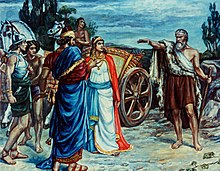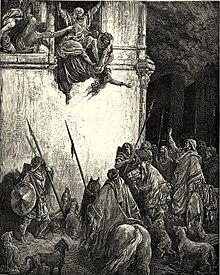Jezebel
Jezebel | |
|---|---|
 Jezebel and Ahab meeting Elijah, print by Sir Francis Dicksee (1853-1928) | |
| Occupation(s) | Princess of Phoenicia, Queen of Israel |
| Spouse | King Ahab |
| Children | Ahaziah, Jehoram, and Athaliah |
| Parent | Ithobaal I |
Jezebel (Hebrew: אִיזֶבֶל / אִיזָבֶל, Modern Izével' / 'Izável Tiberian ʾÎzéḇel / ʾÎzāḇel) (fl. 9th century BC) was a princess, identified in the Hebrew Book of Kings as the daughter of Ethbaal, King of Tyre (Phoenicia) and the wife of Ahab, king of north Israel.[1] According to genealogies given in Josephus and other classical sources, she was the great-aunt of Dido, Queen of Carthage.
The Hebrew text portrays Jezebel as a power behind the throne. Ahab and Jezebel allow temples of Baal to operate in Israel, and that religion receives royal patronage. After Ahab's death, Ahaziah and Jehoram, his sons by Jezebel, accede to the throne. The prophet Elisha has one of his servants anoint Jehu as king to overthrow the house of Ahab. Jehu kills Jehoram as he attempts to flee in his war chariot.
Jehu confronts Jezebel in Jezreel, where he incites her court officials to murder the queen via defenestration and leaving her corpse to be eaten by dogs. Jezebel became associated with false prophets. In some interpretations, her dressing in finery and putting on makeup before her death led to the association of use of cosmetics with "painted women" or prostitutes.
Meaning of name
Jezebel is the Anglicized transliteration of the Hebrew אִיזָבֶל ('Izevel/'Izavel). Attempts to trace the meaning of the name are speculative, since its origin can only be conjectured.
The biblical Hebrew 'Izebel may be rooted in a Hebrew word for "prince/nobility" or "husband" (bul/ba'al) combined with the word for "naught/none" ('iy), "there is no prince/nobility/husband," suggesting a lack of character (i.e. implying lack of royal sensibilities) or of morality (i.e. unmarried, implying adultery or fornication). It may also find its root in a Hebrew word for "dung" (from gbl; note here Ba'al-zebul/Ba'al-zebub, "Lord of dung") combined with the word for either "naught/none" ('iy) or "island" ('iyz), thus "no dung" or "island of dung."[citation needed]
Other sources find meaning from the character's native Syro-Phoenician language. It may be rooted in the word ba'al (lord), referring either to the Syro-Phoenician god, the "King of Heaven," or simply the royal title "lord." Thus, Iz-ba'al may mean "the Lord (Ba'al) exists/exalts" or "where is the prince," a name known from liturgies of the Syro-Phoenician Ba'al cults.[citation needed]
Scripture and history

Jezebel's story is told in 1st and 2nd Kings.The story concerns an intense religious-political struggle — the most detailed such account of any period in the history of the Kingdom of Israel. The account portrays the religious side of the events, with the political, economic and social background — highly important to modern historians — given only incidentally.[2]
Jezebel is introduced as a Phoenician princess, the daughter of Ethbaal, king of the Phoenician empire. She marries King Ahab of the Northern Kingdom (i.e. Israel during the time when ancient Israel was divided into Israel in the north and Judah in the south). She helps convert Ahab from worship of the Jewish God to worship of the Phoenician god Baal. After she has many Jewish prophets killed, Elijah challenges 450 prophets of Baal to a competition (1 Kings 18), exposes the rival god as powerless, and has the prophets of Baal slaughtered (1 Kings 18:40). Jezebel becomes his enemy.[2]
The scholar V. Barzowski interprets Ahab's marriage to Jezebel as a dynastic marriage intended to cement a Phoenician political alliance. This went back to the times of King Solomon, to give the then-inland Kingdom of Israel access to the Mediterranean Sea and international trade. The monarchy (and possibly an urban elite connected with it) enjoyed the wealth derived from this trade, which gave it a stronger position vis-a-vis the rural landowners. The monarchy became more centralized with a powerful administration.[3][dubious – discuss]
Barzowski believes that the story of Naboth, a landowner killed at the instigation of Jezebel so the King could acquire his land, points to this interpretation. With her foreign religion and cosmopolitan culture, Jezebel represented a hated Phoenician alliance from which the landowners had little to gain and much to lose. Their resentment was expressed in religious terms as related to the difference in religions. Eventually Jehu's achieved a bloody coup, instigated and supported by the prophets whose actions the Bible preserves.[3]
Interpretations

In The Bloudy Tenent of Persecution for Cause of Conscience, Roger Williams, the founder of the American colony of Rhode Island and the co-founder of the First Baptist Church in America, wrote of Naboth's story as an example of how God disfavored the use of government force in religious matters. Williams believed using force in the name of religion would lead to political persecution, contrary to the Bible's teachings.[4]
Ilana Fine sees Jezebel as an assertive woman, who was attacked and finally murdered by the fanatic representatives of a male-dominated religion. She interprets her memory as vilified for thousands of years for the same reason — i.e. "because she was an independent woman who did not let men dominate her, and who continued to defy the aggressives males to her last breath."[5]
Cultural symbol

The name Jezebel came to be associated with false prophets, and further associated by the early 20th century with fallen or abandoned women.[6] In Christian lore, a comparison to Jezebel suggested that a person was a pagan or an apostate masquerading as a servant of God. By manipulation and/or seduction, she misled the saints of God into sins of idolatry and sexual immorality.[7] In particular, Jezebel has come to be associated with promiscuity. In modern usage, the name of Jezebel is sometimes used as a synonym for sexually promiscuous and sometimes controlling women,[8] [9] In his two-volume Guide to the Bible (1967 and 1969), Isaac Asimov describes Jezebel's last act: dressing in all her finery, make-up and jewelry, as deliberately symbolic, indicating her dignity, royal status and determination to go out of this life as a Queen.
In popular culture
- The film Jezebel (1938) starred Bette Davis.
- Frankie Laine recorded "Jezebel" (1951), written by Wayne Shanklin, which became a hit song.
- In the film Sins of Jezebel (1953), Jezebel was played by Paulette Goddard.
- In his novel The Caves of Steel (1953, 1954), Isaac Asimov portrayed Jezebel as an ideal wife and woman who, in full compliance with the mores of the time, conscientiously promoted her own religion.[citation needed]
- The Song Jezebel (1985), by Sade ( = Helen Folasade Adu ) and Gordon Matthewman, on Sade's album Promise.
- Lesley Hazleton wrote a revisionist historical non-fiction account, Jezebel, The Untold Story of the Bible's Harlot Queen (2004), that presents Jezebel as a sophisticated queen engaged in mortal combat with the fundamentalist prophet Elijah. Hazleton is also the author of several non-fiction books about the Middle East.
- The Kingdom Keepers: Disney After Dark (2005) There is a character Named Jezebel "Jez" for short.
- Kingdom Keepers 2: Disney At Dawn (2008) Jezebel comes back and everyone finds out her real name is Jessica "Jess" for short.
- Blind Willies recorded "Jezebel" (2011) written by Alexei Wajchman.
References
- ^ Elizabeth Knowles, "Jezebel", The Oxford Dictionary of Phrase and Fable, OUP 2006
- ^ a b BRUCE M. METZGER and MICHAEL D. COOGAN, "Jezebel", The Oxford Guide to People and Places of the Bible, 1 Jan 2001, accessed 15 Nov 2010
- ^ a b V. Barzowski, The Merchants and the Kings - Impact of the Mediterranean Trade Routes from the Phoenicians to the Venetians, Chapter 1.
- ^ Byrd, James P. (2002). The Challenges of Roger Williams: Religious Liberty, Violent Persecution, and the Bible. Mercer University Press. ISBN 0865547718.
- ^ Ilana Fine, Women reading the Bible backwards (in Hebrew), p. 86.
- ^ Chisholm, Hugh, ed. (1911). Encyclopædia Britannica (11th ed.). Cambridge University Press.
{{cite encyclopedia}}: Missing or empty|title=(help) - ^ The New Testament, Book of Revelation., Ch. 2, vs. 20-23.
- ^ http://www.merriam-webster.com/dictionary/jezebel Meaning #2: "an impudent, shameless, or morally unrestrained woman"
- ^ Pilgrim, David. "Jezebel Stereotype". Jim Crow Museum. Ferris State University. Retrieved 29 July 2011.
External links
- Scholars Debate Jezebel Seal Biblical Archaeology Review, 2008
